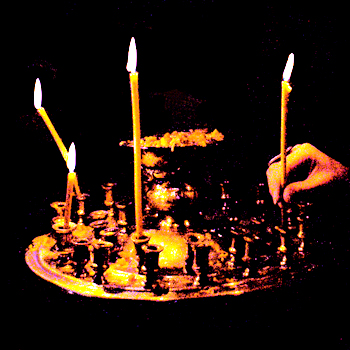 In contrast to literal interpretations of the “Western Bible” common among Christians in the West, Eastern (Greek, Russian or Orthodox) Christianity had mystical “Fathers” who experienced their religion in a way that is surprisingly like Simple Reality (P-A). We will use bold type to indicate the P-A terminology or concepts that parallel the language of the Eastern Orthodox Christian Fathers or saints.
In contrast to literal interpretations of the “Western Bible” common among Christians in the West, Eastern (Greek, Russian or Orthodox) Christianity had mystical “Fathers” who experienced their religion in a way that is surprisingly like Simple Reality (P-A). We will use bold type to indicate the P-A terminology or concepts that parallel the language of the Eastern Orthodox Christian Fathers or saints.
The Wisdom Within, Self-Reliance and the Now
“Therefore, the human being is endowed with intrinsic gifts [feeling]. According to Irenaeus, ‘man was created as a child,’ who emerged from a state of innocence, destined and empowered to grow to maturity.”
“If you gaze upon yourself attentively, that will adequately lead you to the knowledge of God [inner wisdom]. If you reflect upon yourself, you will not have the need of the structure of the universe to look for the Demiurge, but in yourself, as in a microcosm, you will clearly see the great wisdom of your Creator.”
“In the 14th century, St. Gregory Palamas developed an experiential [feeling] concept of knowledge, emphasizing that by being in communion with God one may enjoy a direct knowledge [intuition] of god which is differentiated from a purely intellectual process. This knowledge is based upon the theology of the Image of God in the human person which emphasizes that one naturally possesses the property of transcending oneself [false self] and reaching the Divine [Now].”
Point of Power Practice to Transcend Reactivity
“Another important element of the Image, which sheds light upon the human being as a spiritual being, is the fact that one is able to rise above his or her impulses [conditioning] and to direct his or her spiritual powers toward realities [present moment] other than those which are naturalistic. This human power to transcend the material being [response] is called ‘innate’ by the Fathers.”
Paradigm Shift and the Kingdom of Heaven is Now
“Theosis, deification, or the acquisition of the Holy Spirit, constitutes the aim of the Orthodox Christian life … it is the intense ascent of one who struggles and who is graced to find the Kingdom in this present life [Now].”
Intellect in Service to Intuition Supported by Silence, Solitude and Simplicity
“This approach to knowing explains why Orthodoxy cannot limit itself to scholarly research and writing alone, but requires the experiences of faith in life, i.e., a place for solitude, prayer and quiet.”
“Intellectual knowledge alone is viewed as placing limitations upon the subject and object. So, even a superior degree of knowledge (as conceptual and intellectual) remains partial without the moral, affective and experiential. True understanding comes from the dynamics of all these dimensions.”
“St. Gregory further emphasizes that natural knowing will not help one apprehend God because ‘God knowing’ cannot be described. It is, rather, knowing out of participation [feeling] in God that gives one clarity in the True vision of the world.”
“Called God-presence [Now], this stage is raised above the cares of the world [identification with emotions, thoughts and form]. When knowledge elevates itself above earthly things … faith swallows knowledge, gives a new birth to it. It is now able to examine spiritual mysteries which are attained by simple and subtle intellect [intuition]. This light is perceived by spiritual eyes (concealed by eyes of fleshly men) according to Christ’s words: ‘I shall send you the Spirit, the Comforter [True self], whom the world cannot receive and He will guide you in all truth.’” (John 16:13)
Life Becomes a Meditation
“… perpetual prayer; the latter is the crown of ascetic practice—St. Paul’s ‘pray without ceasing’ [to always be in response].” (Thes. 5:17)
Beware of the Distractions of the Senses
“Evagrios vigorously rejects all visible theophanies … He considers this demonic illusion.” Just as the Buddha warned of the distractions of siddhis or demands of the false self energy centers, Eastern Fathers gave similar warnings.
The Heart (Wisdom, Intuition or Feeling)
“‘Experience’ is the proof of truth rather than formulae … We have tasted God, we have experienced Him … Grace itself engraves the laws on the spirit on their hearts … for it is in the heart that intelligence dwells … In this participation God offers ‘intimacy,’ a result of our ‘affective’ and ‘moral’ knowledge of God … St. Seraphim of Sarov responded to the question of the ‘purpose of Christian life,’ ‘For the Kingdom of God is the human heart …’”
Stages of Growth
“Image [intuition or inner wisdom] … is the potential of the individual to develop (to love, to reason, to create).”
“Conversion [paradigm shift, insight, right view] … Metanoia is a stage of conversion where the individual makes a conscious commitment, a choice, to direct his or her life ‘in Christ.’”
“Purification [Point of Power “response” or “feeling”] … Apatheia (purification or transformation) occurs when one is loosened from worldly passions and is free in his or her spirit from things which distract the individual from his or her goal.”
“Illumination [present moment experiencing compassion, freedom, peace and joy] … Theosis (union) is not an end state but a goal into which one enters, as St. Gregory of Nyasa says, ‘from glory to glory.’ It is a state of being ‘in communion, participation’ with the Holy Spirit in life.”
_________________________________________________________
References and notes are available for this essay.
Find a much more in-depth discussion in books by Roy Charles Henry:
Who Am I? The Second Great Question Concerning the Nature of Reality
Where Am I? The First Great Question Concerning the Nature of Reality
Simple Reality: The Key to Serenity and Survival


